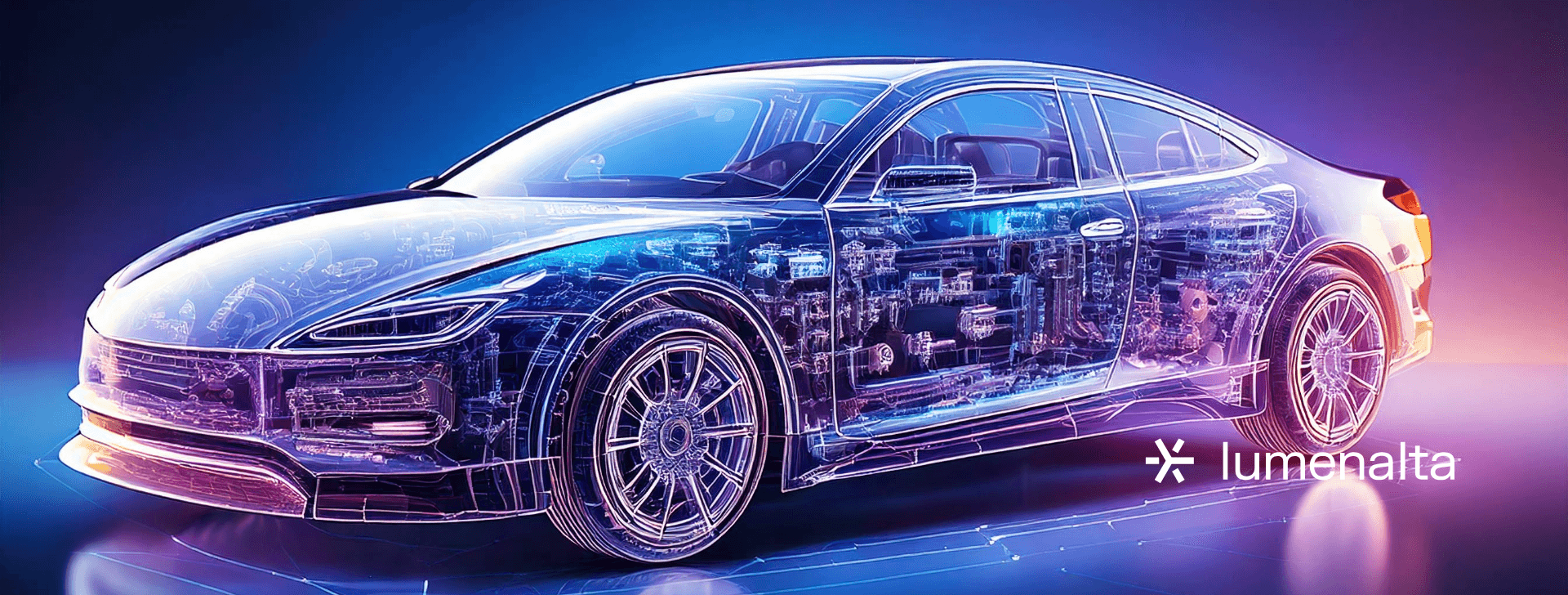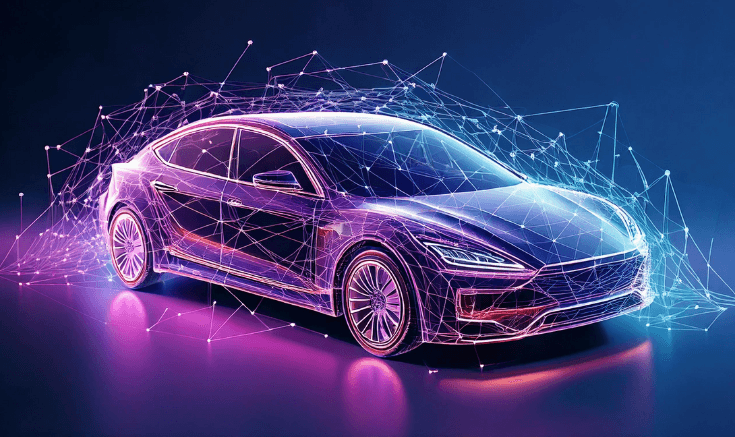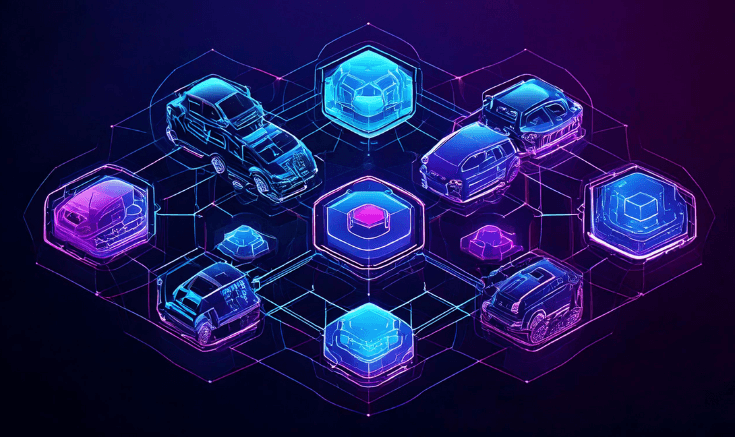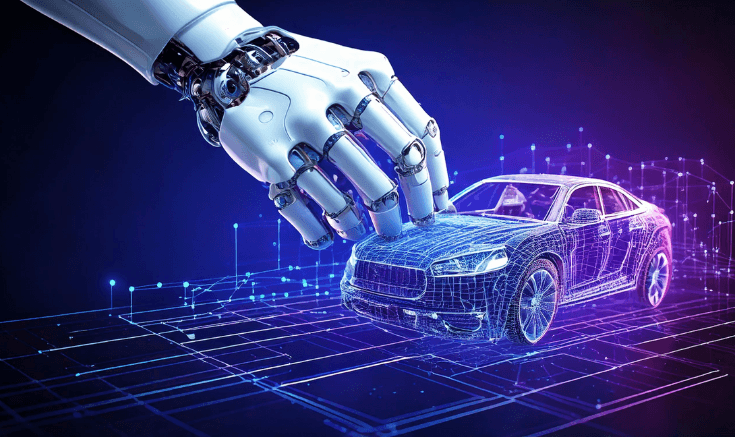

How AI is transforming the automotive industry
JAN. 7, 2025
8 Min Read
AI is reshaping the automotive industry, enabling smarter vehicles, optimizing manufacturing, and transforming how automakers deliver value to consumers.
These technologies unlock new efficiencies, streamline production processes, and deliver personalized driving experiences. As demonstrated by the recent Cerence and NVIDIA collaboration, AI-powered innovations are advancing in-car functionality and accelerating scalable, future-ready solutions that drive measurable business outcomes.
Key takeaways
- 1. AI enhances automotive operations by improving production efficiency, vehicle safety, and customer personalization.
- 2. Scalable AI solutions enable manufacturers to adapt to market demands and deliver cost-effective results with measurable business impact.
- 3. Autonomous vehicle development relies on AI for real-time data analysis and machine learning to ensure safety and reliability.
- 4. Predictive maintenance and AI-led quality control improve manufacturing reliability and reduce downtime, cutting operational costs.
- 5. Collaborative advancements in AI, like those between Cerence and NVIDIA, highlight the future potential of in-vehicle systems and customer-focused innovation.
What is AI in the automotive industry?

Artificial intelligence (AI) is pivotal in enhancing the automotive sector, introducing capabilities that improve operational efficiency, enhance safety, and enable scalable innovations. Through technologies like machine learning, computer vision, and natural language processing, AI supports smarter vehicle systems, optimized production processes, and intelligent tools aligned with evolving industry needs.
AI applications in the automotive sector span areas like autonomous vehicles, predictive maintenance, and connected systems. Automakers benefit from AI to optimize supply chain operations, improve quality control, and implement real-time solutions that directly address operational challenges. The Cerence-NVIDIA collaboration highlights how partnerships are unlocking untapped potential for voice-based assistant technologies, improving in-car user experiences while addressing scalability and efficiency demands. These advancements reduce costs, accelerate production timelines, and enhance customer experiences, ensuring businesses remain competitive and prepared for long-term growth.
How AI helps the automotive industry

AI has unlocked new possibilities for automakers to address operational challenges, enhance production efficiency, and deliver cutting-edge vehicle technologies. The following highlights how AI transforms the automotive sector:
- Optimizing production processes: AI-powered robotics and automation streamline manufacturing, improving assembly line speed and reducing error rates.
- Enhancing vehicle safety: AI integrates with advanced driver-assistance systems (ADAS) to provide real-time object detection, collision warnings, and automated emergency braking, improving road safety.
- Improving supply chain management: AI enables predictive analytics to forecast demand, optimize inventory levels, and manage logistics, ensuring efficient supply chain operations.
- Personalizing user experiences: AI-led infotainment systems use natural language processing to offer voice-activated controls, personalized recommendations, and real-time navigation.
- Facilitating autonomous driving technologies: AI supports autonomous vehicle development through machine learning models that analyze vast amounts of sensor data to make accurate, real-time decisions.
- Reducing maintenance costs: AI predictive maintenance tools monitor vehicle health, forecast potential issues, and recommend timely repairs, minimizing downtime and repair expenses.
AI in the automotive sector delivers cost savings, speeds up production, and enhances customer satisfaction while positioning companies to adapt to industry changes and innovations effectively.
"Artificial intelligence plays a critical role in redefining the automotive sector by introducing capabilities that improve operational efficiency, enhance safety, and enable innovation."
Key applications of AI in automotive manufacturing

AI is transforming automotive manufacturing by delivering measurable improvements in productivity, cost savings, and operational efficiency. Its applications address critical industry challenges, driving scalable results across production processes.
Robotics with AI precision
AI-powered robotics transform assembly lines by automating complex tasks with remarkable speed and accuracy. These systems minimize human error, reduce downtime, and significantly increase production capacity, making them essential for scaling operations to meet growing market demands. Adaptable to diverse production needs without requiring extensive reprogramming, AI-enabled robotics ensure seamless integration into existing workflows, enabling manufacturers to achieve consistent output quality and operational efficiency.
Predictive maintenance systems
Machine monitoring systems powered by AI revolutionize maintenance by analyzing sensor data in real time to detect early signs of performance issues. These predictive systems proactively identify potential malfunctions before they escalate into costly breakdowns, minimizing unplanned downtime. By optimizing equipment utilization and extending the lifespan of critical assets, predictive maintenance enhances operational reliability and reduces maintenance costs, ultimately driving better ROI for manufacturers.
Advanced quality inspections
AI-integrated quality control systems use cutting-edge computer vision technology to identify defects in components and assemblies with unparalleled precision. These tools continuously monitor production lines, performing high-accuracy inspections that improve product reliability and ensure consistent quality standards. AI-led inspections help manufacturers achieve greater cost-effectiveness and customer satisfaction by reducing waste, minimizing rework, and increasing efficiency.
Supply chain optimization
AI enhances supply chain operations by analyzing vast datasets, including demand patterns, logistical information, and inventory levels, to provide actionable insights. These systems offer accurate demand forecasting, reduce the risk of overproduction or stock shortages, and minimize inefficiencies across the supply chain. By streamlining processes and addressing operational bottlenecks, AI helps manufacturers reduce costs, improve delivery times, and strengthen overall supply chain resilience.
Accelerated design and prototyping
AI-powered generative design tools enable manufacturers to reimagine the vehicle development process by analyzing engineering constraints and producing optimized, innovative prototypes. These tools speed up the design process, allowing manufacturers to reduce time-to-market and respond swiftly to shifting market demands. Additionally, AI supports the creation of lightweight, cost-effective designs that meet stringent performance and safety standards, providing a competitive edge in the market.
Energy-efficient production
AI supports sustainable manufacturing by optimizing energy consumption and reducing material waste, addressing both cost and environmental impact concerns. Through intelligent systems that monitor and adjust energy usage in real time, manufacturers can achieve greater operational efficiency while adhering to corporate sustainability goals. AI’s role in energy-efficient production helps companies meet regulatory requirements, improve profitability, and align with growing consumer demand for eco-friendly practices.
AI in automotive manufacturing addresses core business needs by enabling faster processes, scalable solutions, and measurable returns. Its applications position automakers for long-term success by aligning production strategies with emerging market opportunities, ensuring competitiveness and adaptability in an evolving industry.
7 benefits of AI for automakers and investors

Artificial intelligence offers significant advantages to automakers and investors by enhancing efficiency, reducing costs, and unlocking new revenue streams. These benefits create substantial opportunities for long-term growth and measurable financial impact:
- Improved production efficiency: AI-powered automation accelerates production cycles while minimizing errors. This increases output without adding significant operational costs, enabling faster time to market.
- Cost-effective operations: Predictive maintenance systems reduce downtime by identifying potential equipment failures before they happen. This decreases repair costs and maximizes asset utilization, contributing to a leaner production process.
- Enhanced vehicle safety and reliability: AI integrates advanced driver-assistance features such as object detection, lane-keeping systems, and automated braking. These improvements strengthen consumer trust and position vehicles as high-quality, dependable options in competitive markets.
- Personalized customer experiences: AI-led infotainment and telematics systems deliver tailored user experiences, from voice-activated commands to predictive route planning. These features improve customer satisfaction and foster brand loyalty.
- Optimized supply chains: AI analyzes logistical data to manage inventory levels and streamline procurement processes. This creates a more agile supply chain, preventing delays and reducing unnecessary expenditures.
- Increased scalability: AI tools allow manufacturers to scale operations efficiently by automating processes and adapting to production demands. This scalability aligns with market needs and provides flexibility to handle fluctuations in demand.
- Future-proof investments: AI technologies lay the foundation for autonomous vehicles, predictive services, and sustainable manufacturing. These innovations align with industry trends and position businesses for long-term success.
AI creates tangible value by improving productivity, reducing costs, and enhancing customer experiences. For investors, these advancements translate to higher returns and a stronger competitive position in the automotive sector.
Maximizing business impact with scalable AI in automotive
Scalable AI transforms automotive operations by delivering cost-effective solutions that meet the demands of modern manufacturing and customer experience. Its ability to adapt production workflows and enhance process efficiency makes it a critical asset for automakers seeking measurable improvements in time to market and resource management.
AI-powered tools support production agility, helping manufacturers adjust to fluctuating demand and optimize supply chain operations. Predictive analytics provides accurate forecasts for production planning, reducing overproduction and eliminating unnecessary costs. These advancements accelerate timelines and enhance overall profitability, making scalability a key factor in operational success.
Collaborative advancements in AI are shaping the future of in-vehicle systems. The recent partnership between Cerence and NVIDIA highlights breakthroughs in AI technologies like conversational voice assistants and real-time navigation, setting a benchmark for integrated automotive solutions. These innovations allow automakers to deliver customer-focused experiences while aligning with industry trends.
Scalable AI enhances business potential by delivering adaptable, innovative solutions that maximize returns and strengthen market positioning. Its integration into automotive processes supports operational efficiency and long-term profitability, equipping companies with the tools to address emerging challenges effectively.
"Scalable AI enhances business potential by delivering adaptable, innovative solutions that maximize returns and strengthen market positioning."
Challenges of adopting AI in the automotive sector
Despite its transformative potential, adopting AI in the automotive industry presents several challenges that companies must address to achieve successful implementation. These obstacles often require strategic planning, collaboration, and investment to overcome effectively.
- High implementation costs: Developing and integrating AI technologies, such as machine learning models and robotic systems, often involves significant financial investments. Smaller manufacturers may face difficulties allocating budgets to such initiatives without straightforward short-term returns.
- Data quality and availability issues: AI systems rely on vast amounts of accurate data for training and operations. Many manufacturers struggle with fragmented or incomplete data sets, limiting the effectiveness of AI applications and reducing their impact.
- Integration complexities: Merging AI systems with existing infrastructure, such as legacy equipment and software, can be technically challenging. These integrations often require specialized expertise and time, delaying potential benefits.
- Skill gaps in the workforce: Many organizations lack personnel with the technical expertise to develop, implement, and maintain AI solutions. Addressing this gap involves investing in training or recruiting highly skilled professionals, which can increase costs further.
- Regulatory and ethical concerns: Autonomous vehicles, advanced driver-assistance systems, and data-backed insights often raise questions about safety, liability, and data privacy. Navigating these regulatory complexities requires compliance with varying standards across regions and markets.
- Resistance to change: Organizational inertia and resistance to adopting new technologies may hinder AI adoption. Change management and alignment among stakeholders are critical to overcoming this barrier and fostering a culture of innovation.
Addressing these challenges requires a balanced approach that includes targeted investments, collaboration with technology partners, and clear strategies for change management. Overcoming these obstacles allows automakers to capitalize on AI technologies' transformative potential fully.
Future of AI in the automotive industry

The future of AI in the automotive industry is poised to redefine how vehicles are designed, manufactured, and experienced. Emerging advancements are expected to shape an era of innovation that prioritizes efficiency, sustainability, and enhanced user experiences.
Autonomous vehicles remain among the most anticipated advancements, with AI playing a pivotal role in enabling self-driving capabilities. Enhanced machine learning models and real-time sensor data analysis will make autonomous cars safer and more reliable. These developments align with market demands for innovative mobility solutions and offer opportunities for automakers to tap into new revenue streams.
AI will also continue to drive more innovative manufacturing processes, enabling more agile production systems that adapt to shifting market needs. Predictive analytics and generative design tools will enhance efficiency while supporting sustainable practices by reducing waste and energy consumption.
Investments in AI technologies are expected to provide automakers with a competitive edge while delivering measurable returns for stakeholders. The future of AI in the automotive sector points to a transformative path, enabling businesses to scale, innovate, and meet consumer and industry demands.
AI technologies are modifying automotive operations by driving more imaginative production, scalability, and long-term value. With tailored solutions designed to address your unique business needs, Lumenalta helps you capitalize on the potential of AI to achieve efficiency, profitability, and growth. Let’s build a brighter future together.
table-of-contents
- What is AI in the automotive industry?
- How AI helps the automotive industry
- Key applications of AI in automotive manufacturing
- 7 benefits of AI for automakers and investors
- Maximizing business impact with scalable AI in automotive
- Challenges of adopting AI in the automotive sector
- Future of AI in the automotive industry
- Common questions about AI in the automotive industry
Common questions about AI in the automotive industry
How does AI impact the automotive industry?
What role does AI play in automotive manufacturing?
How is AI used in autonomous vehicles?
What are the benefits of scalable AI in the automotive industry?
What challenges do automakers face when adopting AI?
Want to learn how artificial intelligence can bring more transparency and trust to your operations?






